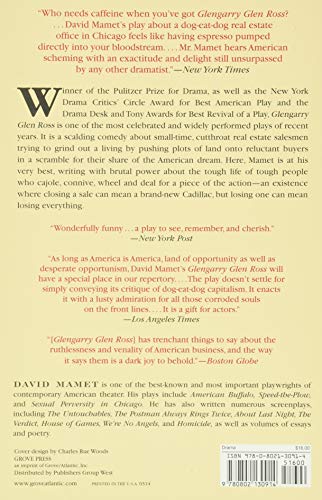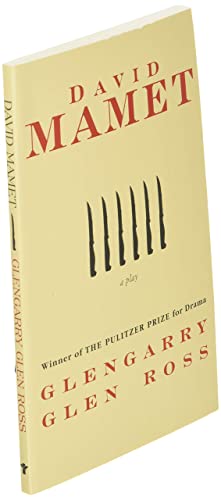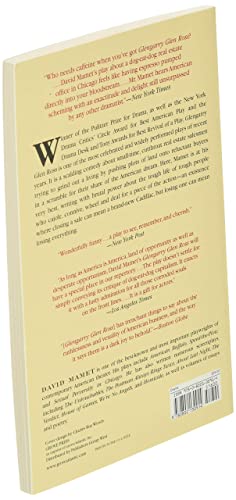




Glengarry Glen Ross: A Play
M**Y
A Modern American Masterpiece
This powerful and moving play--winner of the 1984 Pultizer Prize for Drama--uses the world of real estate sales to depict four salesmen who who work, or maybe struggle, to "close a deal" with less than ideal clients (financially speaking). The key word here is "closing." Throughout the play we hear the mantra "Always be Closing" as these men compete for the highest sales, which can lead to better sales leads and maybe even a new Cadillac.The characters make this play powerful. Shelly, in his 50s, has a great history as a salesman but struggles today. The play begins with him negotiating--almost begging--for a prime sales lead. Unfortunately the dog-eat-dog world that currently employes him has little or no appreciation for his current failures and past success. Meanwhile Shelly tries to pass off his current performance (or lack of) as a slump, a move that somewhat reminds me of Willy Loman making excuses. Though Willy Loman and the characters of this play live in the same American dream of manifest destiny, the similarities are limited. Starting with Shelly, the characters of Mamet's play seem to have a more vicious inward-looking and selfish perspective toward life. Their American dream seems shallow and selfish compared to Willy's.We see this same selfishness in scene two where Moss and Aaronow discuss the opportunity to steal the best customer leads (lists of names) from their own office, sell them to a competitor, and then maybe go work for that competitor. Like Shelly, these two salesmen appear selfish as they first fantasize about the midnight adventure only to find that one of them is quite serious.Next comes Roma, the apparently most successful salesman of this group who is in his 40s. Not seeing Roma until the third scene, we cannot help but wonder if he will one day end up with a merciless boss who doesn't care about past sucesses (just like Shelly and the others who are in their 50s)? Roma seems to articulate the most certain morality of the main characters. He initially appears most anchored, but toward the end he talks with a customer experiencing sales remorse and we are left to wonder about Roma as well.The play's end is quite compelling. We are not surpised in one sense, giving the ethical code of this bunch. Yet, we are quite surprised to see who emerges "alpha male" inside this office. I cannot help feeling some compassion for these salesmen who manipulate, scheme, and appear to think little of anyone but themselves. It is an amazingly simple and powerful conclusion.I read this play in a single evening. I could not put it down. The tensions Mamet creates are compelling and many. Not since Miller's "The Crucible" have I read such a powerful play. Though this is the first work I have read from Mamet, I think I can begin to see why his work is so highly regarded. I am only sorry that the play is short and does not require more than one evening to finish. I would have enjoyed spending more time with the text.
J**D
As good in print as it is on the screen
Although I will always picture in my mind the absolutely stellar cast (Lemmon, Pacino, Harris, Arkin, Spacey, Baldwin, Pryce) from the 1992 New Line Cinema motion picture, I would like to imagine that the stage productions provided equal measures of vitality. After all, it is the words themselves which are important here. Thus, my 5-star review of Glengarry Glen Ross is equally appropriate for this, the original play. This trip through David Mamet's unique voice is very enjoyable, not least because the film stayed true to the original. (Mamet adapted his own work for the film.)A few important differences are noted below.* In the film, the end of Scene One, where Levine and Williamson take shelter in the car during a rainstorm, is very effective. The closed quarters highlight the desperation. In the play, their entire conversation takes place in the restaurant. Also, an early portion of the long conversation between Moss and Aaronow takes place in the coffee shop, while in the play, they are in the Chinese restaurant as well. Here, too, I think the settings in the film are better, as we see Aaronow being pursued from place to place. Glengarry Glen Ross shows us, after all, that it isn't only suckers who are targeted; the salesmen go after each other as well. [Note: one (ad-libbed?) improvement was Ed Harris' "The leads to Graff. Yes. I was saying--yeah. A guy could take--like anything else, it seams to me, that is negotiable, a guy could sell them."]* Of course the absence of Alec Baldwin's character (named Blake, not that it is ever used in the film, other than in the credits) is notable. Mamet wrote in this role expressly for the film. Of somewhat less importance is the role of Larry Spannel which also does not appear in the original script.* Act Two seems almost entirely identical, play vs. film. The most intriguing (and disturbing) difference seems to be with Roma's character at the very end. He becomes much less likable by attempting to cut in on Levine's commissions. Or is there something more to the story that I missed?Fourteen bucks is a lot to pay for what is a very fast read, but then again I am not rating based on price, and in the end this is something you can enjoy frequently. I know I do.(Winner of the 1984 Pulitzer Prize for Drama)
A**I
Good seller...
......quick and easy transaction. Item as posted.
J**Y
If you've seen the movie, it is not the ...
If you've seen the movie, it is not the play. At least the play did not have the hard hitting scene by Alex Baldwin "put that coffee down" However all the interp[aly of word that David Mamet is so famous for is here. These words are these men. They live or die by their words. Untrue words, if need be, and it seems they are often needed. Read to understand the power of words, as dialogue, there is no real narrative here. None is needed. You understand very quickly what is at stake.
R**A
Powerful Language
The film version of Mamet's play with Jack Lemmon and Al Pacino is incredible and having recently attended a production of this play in the West End of London I was intrigued by the slight differences between the screenplay and the original. That's what prompted me to purchase the play and read it.Mamet's language is powerful and the cadences that he writes for his characters really drive the action and reveal truths about their characters in subtle yet absolute ways.This particlar version has some great introductory material about Mamet's life and work as well as some critical analysis of the play that I found very enlightening. For me this was well worth the special order.
J**N
So F-ing Good
Exhilarating, terrifying, desolate, and fascinating. These are real people in a real time and in a real place. Perfection.
S**F
Great play.
My acting teacher recommended this book to me when I was looking for a scene for class. After I read the book I was blowing away. I just like the way David Mamet writes. I mean he's a master play write. After reading this book, I started reading other David Mamet plays, and I also saw the movie too. I did a character from the book and I loved it.
A**R
A great Mamet play!
A fantastic play that features tension and desperation within the real estate agent business. A great play for an exam, performance, or a good read. Characters are funny and tragic all at the same time, and Mamet's work, as always is dramatic, funny and brilliant.
A**Y
Five Stars
A modern classic. The film is also well worth a watch.
K**E
Great read.
I bought this for my university degree. The item was dispatched quickly and was good value and an excellent read. Thank you.
S**Y
Five Stars
Love it.
K**B
Five Stars
Product delivered as describe
Trustpilot
1 month ago
2 weeks ago